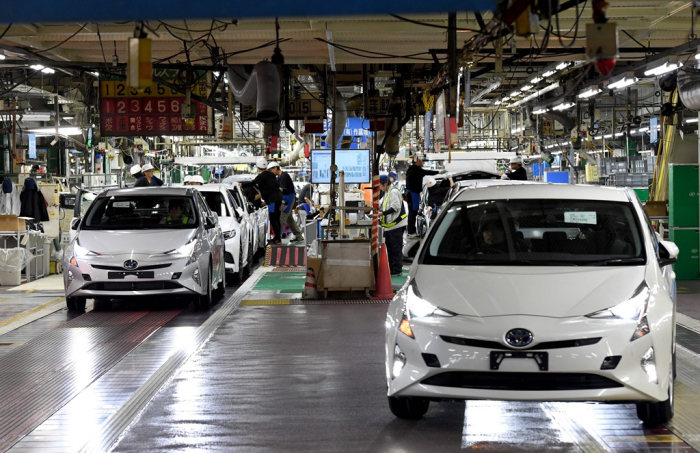Automobiles
Carmaker stocks hit speed bump of chip shortage, Delta variant
Toyota’s surprise output cut plan crumbles global peers; Hyundai overtaken by KakaoBank in market capitalization
By Aug 20, 2021 (Gmt+09:00)
3
Min read
Most Read
LG Chem to sell water filter business to Glenwood PE for $692 million


Kyobo Life poised to buy Japan’s SBI Group-owned savings bank


KT&G eyes overseas M&A after rejecting activist fund's offer


StockX in merger talks with Naver’s online reseller Kream


Mirae Asset to be named Korea Post’s core real estate fund operator



Shares in global carmakers such as Hyundai Motor Co. and Toyota Motor Corp. are tumbling. The automotive chip shortage is expected to deteriorate further in the second half, while a spread of the Delta variant in Southeast Asia disrupted supply of other components. Their stocks are predicted to fall further, according to analysts.
Hyundai Motor on Aug. 20 closed down 2.42% at 201,500 won ($170.3), underperforming a 1.2% decline in the wider Kospi. South Korea’s top automaker was overtaken by KakaoBank Corp., which was listed about two weeks ago, in market capitalization.
TOYOTA CUTS OUTPUT
Hyundai’s overseas competitors also suffered tumbles in their shares. Toyota skidded 4.1% on the day, extending its loss to 8.3% in the latest two sessions. Volkswagen AG fell 1.9%, while Ford Motor Co. slipped 2.5%.
The weakness came after Toyota announced a surprising plan to cut production. The Japanese automaker said on Aug.19 that it would reduce global output for September by 40% from the previous plan due to the sustained chip shortage and disruption of parts supply amid the increasing Delta variant in Southeast Asia that interrupted production of car parts.
The slash was a shock to the global auto industry as Toyota has been reporting strong sales with excellent supply chain management despite the automotive chip shortage this year. It sold 5.5 million vehicles in the first half, maintaining the global top carmaker. Volkswagen, the No.2, sold 5 million, while General Motors Co. and Hyundai Motor Group sold 3.5 million each.
The chip shortage is forecast to slash global car production by up to 7.1million units and the condition is expected to improve in the second half next year at the earliest, according to IHS Markit on Aug. 19.
Investment news site Motley Fool said the Toyota output cut suggests that global automakers' shipments and revenue are expected to remain well below pre-pandemic levels for a while longer -- certainly beyond the end of 2021.
SLOWING NEW CAR DEMAND
Demand for new cars is also falling. The Manheim Used Vehicle Index, an indicator of new car demand, had risen earlier this year to hit a record high of 203 in May, but declined to 200.4 in June, 195.2 in July and 193.7 in the middle of this month. That suggested consumers who had been looking for used cars due to delays in new car shipments do not want cars as much as before.
Cooling new car demand and sustained chip shortage soured investment sentiment on Hyundai Motor. Its shares lost 30.3% from a peak in January when speculations of a potential tie-up with Apple Inc. on the development of autonomous electric vehicle boosted the stock prices.
Analysts warned that it remains risky to buy automakers’ stocks on dips.
“Hyundai Motor’s material costs per vehicle rose to a record high of some 18.9 million won in a half-year earnings report, while growth in sales at home and in developed countries started slowing,” said CGS-CIMB Securities research head Hwang Kyung-jae. “Automakers’ stocks are expected to stay weak in the next six to seven weeks on the sustained chip shortage and demand risks.”
Hyundai Motor also needs to prepare for measures to deal with stricter environmental regulations across the globe, Hwang pointed.
“Tighter environmental rules may create a cliff in demand for internal combustion engine cars. That is also a task for Hyundai will have to solve for the next two or three years. It needs future investment accompanied by profits from eco-friendly cars to enhance shareholders’ value.”
Write to Sulgi Lee at surugi@hankyung.com
Jongwoo Cheon edited this article.
More to Read
-
 EV tie-upHyundai says not in talks with Apple over self-driving cars
EV tie-upHyundai says not in talks with Apple over self-driving carsFeb 08, 2021 (Gmt+09:00)
2 Min read
Comment 0
LOG IN


